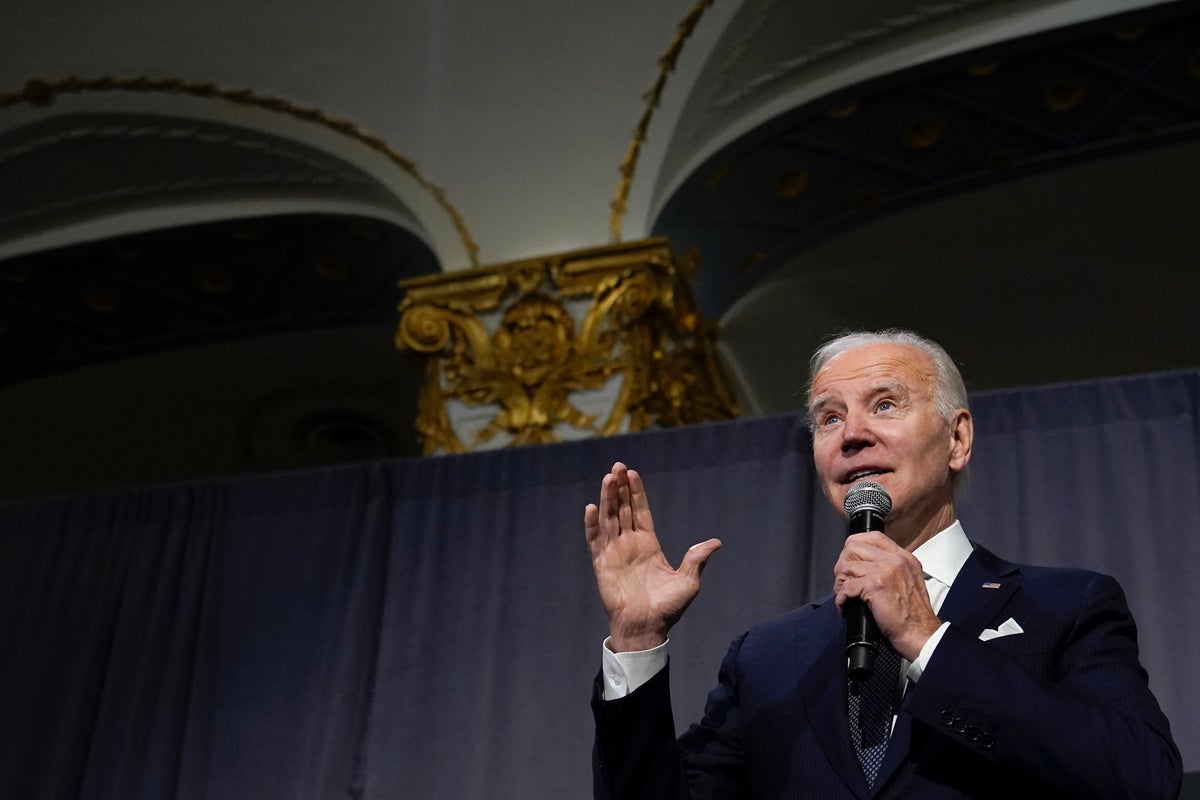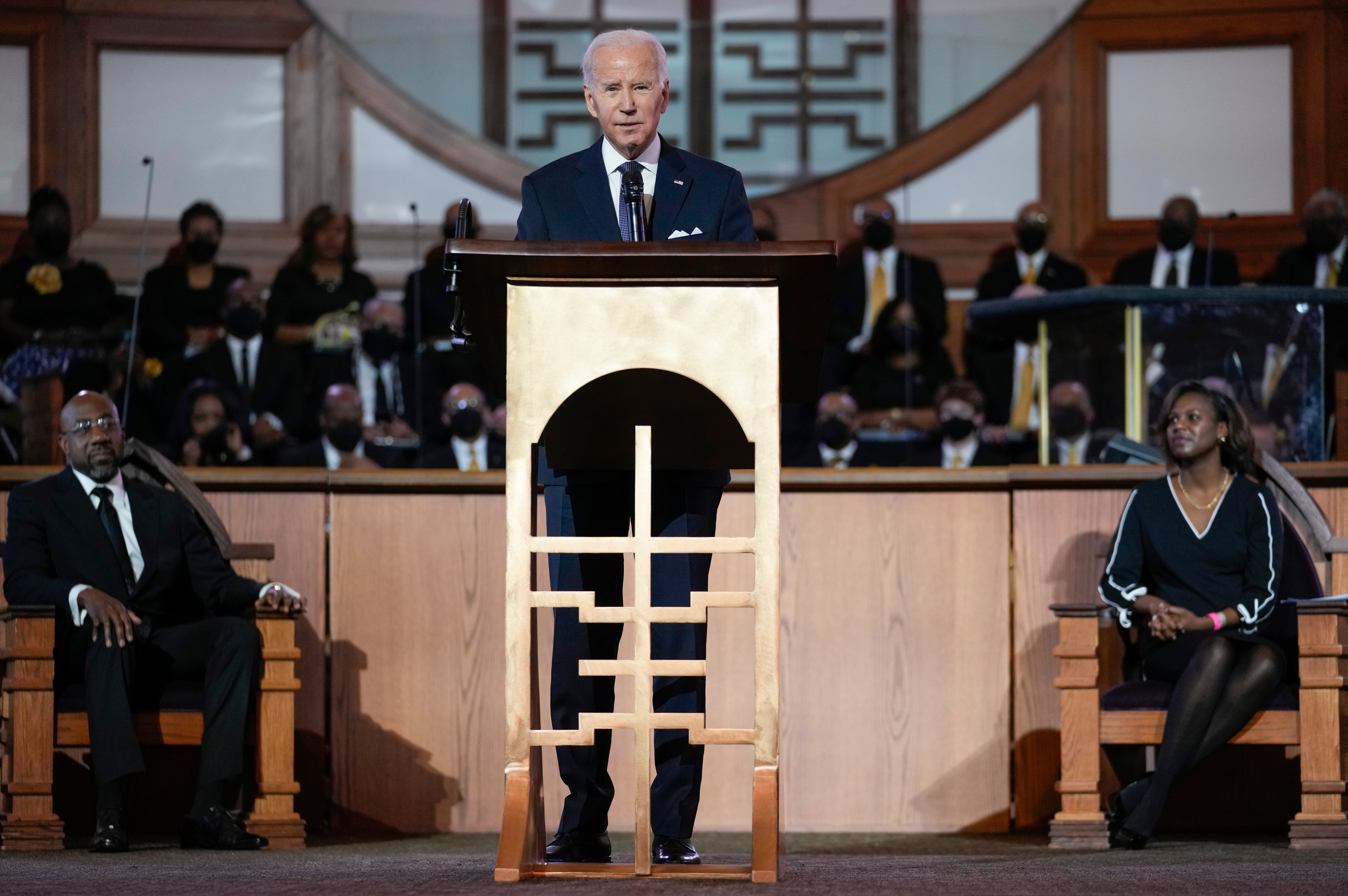
A lot can happen in a year.
One year ago, from the same city, President Joe Biden warned how history has treated the architects of voter suppression and the opponents of landmark civil rights laws as state lawmakers mulled a wave of antidemocratic legislation taking aim at the right to vote.
“History has never been kind to those who have sided with voter suppression over voters’ rights,” he said in his remarks from Atlanta on 11 January, 2022. “And it will be even less kind for those who side with election subversion. So, I ask every elected official in America: How do you want to be remembered?”
He suggested that proponents face a choice to stand on either the side of King and the late civil rights leader John Lewis, or with segregationists like George Wallace and Bull Connor and Confederate president Jefferson Davis, a comparison that enraged his opponents but underscored the ferocity of an all-or-nothing challenge to lawmakers across the US and in Washington DC.
One year later, not a single piece of critical federal legislation that he championed – including the renewal of the Voting Rights Act of 1965, which was to be named in honour of Lewis – passed in Congress. The new Republican-controlled House of Representatives and a paper-thin Democratic majority in the Senate are unlikely to revisit them.
An insurgent wave of so-called “election-denying” candidates lost top positions for statewide office in midterm elections last fall, and Democratic, pro-democracy state legislative majorities made major inroads to protect voting rights in battleground states last year.
But fuelled by key losses in Congress, a rising tide of GOP challenges to election administration and the perserverence of the “big lie” that Donald Trump won the 2020 election, the president has made defeating autocracy and the rise of far-right threats to democracy cornerstone themes in his message to Americans.

In remarks from the pulpit inside Ebenezer Baptist Church on 15 January, where King preached up until his murder in 1968, Mr Biden noted that the US has reached an “inflection point” on what would have been the late civil rights leader’s 94th birthday.
“We know there’s a lot of work that has to continue on economic justice, civil rights, voting rights and protecting our democracy, and I’m remembering that our job is to redeem the soul of America,” Mr Biden said, reviving a theme that has defined his campaign speeches and public remarks on American democracy and the preservation and expansion of voting rights.
“Look, I get accused of being an inveterate optimist,” he added. “Progress is never easy. But redeeming the soul of the country is absolutely essential.”
In remarks at the National Action Network’s prayer breakfast honouring the late civil rights leader on Martin Luther King Jr Day on Monday, the president said “we cannot let the filibuster be an obstacle” to voting rights legislation in the Senate.
His demand to Senate lawmakers to reform the procedural hurdle was at the centre of his remarks one year earlier.
“This is a time for choosing,” he said on Monday. “Will we choose democracy over autocracy, community over chaos, love or hate? These are the questions of our time.”
As he spoke last year, Democratic senators held a series of speeches in support of federal legislation to create national standards for early and mail-in voting, voter ID laws and automatic voter registration and combat state legislative attempts to inject partisan oversight of election administration.
The legislation sought to renew the Voting Rights Act of 1965, which Republicans nearly universally opposed in 2021 for the first time since its passage, after the US Supreme Court tossed out critical elements of the landmark civil rights law in 2013.
But the measure was ultimately defeated after Senators Joe Manchin and Kyrsten Sinema dashed Democratic hopes by joining with Republicans to reject changes to the filibuster.
Last month, the Supreme Court heard oral arguments in a case weighing the legitimacy of a fringe legal theory supported by right-wing groups and Republican officials that opponents warn could sow chaos in American elections.
“I stand here at a critical juncture for the United States and the world,” Mr Biden said in his Sunday sermon, noting that the courses of action among world leaders over the next few years will determine “what the world looks like” over the next three or four decades.
“It happened after World War II. It’s happening again. The world is changing. There’s much at stake,” he said. “This is a time of choosing, direct choices we have. Are we a people who will choose democracy over autocracy?”
As the nation reflects on King’s life and work, Americans must “contemplate his moral vision and commit ourselves to his path,” he said.



.png?w=600)



